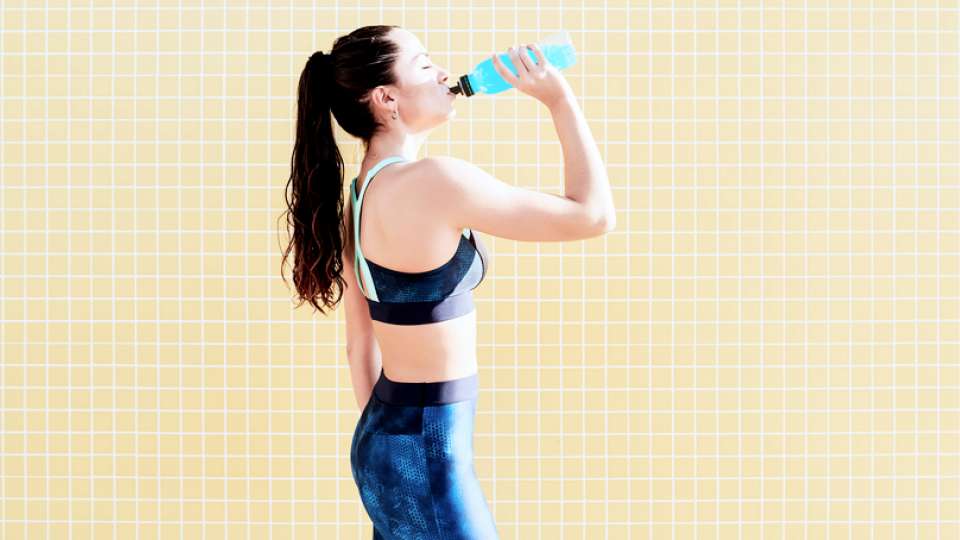
You’ve probably seen the term “electrolytes” plastered on popular sports drinks that are dramatically guzzled by famous athletes in advertisements.
But what exactly are electrolytes — and why do you need them? Dr. Ashley Austin, a sports medicine and family medicine doctor, pours some insight on this subject so next time you sweat, you’ll know when and how to replenish your electrolytes the right way.
What electrolytes are
Electrolytes have become a buzzword on sports drinks and fancy water brands, but simply put, they’re minerals.
“Electrolytes are minerals with electrical charges that dissolve in water and assist with the body’s essential functions including supporting the body’s organs and systems,” says Austin. “These minerals include calcium, magnesium, phosphate, potassium, chloride and sodium.”
Because they’re essential to our cell and organ function (and literally keep us alive each day), it’s important to pay attention to your electrolyte levels — especially when you’re doing activities that cause electrolyte loss, such as a long hike, a sweaty yoga sesh or a big bike ride.
How you lose electrolytes
The loss of electrolytes is typically tied to exercise and sweating. But you can also lose these essential minerals in other fluids, such as vomiting and diarrhea. (In other words, if you’re human, you should care about your electrolytes.)
According to Austin, medication and chronic diseases can cause electrolyte loss as well.
“These chronic diseases include infection and diseases of the liver and/or kidney, cancer, endocrine disease, gastrointestinal disease, cardiac or lung disease,” she says.
When your body is low on electrolytes, you may feel nauseated, dizzy and get muscle cramps. Low electrolyte levels can also cause low blood pressure, decreased nerve function, confusion, as well as poor athletic performance and recovery.
Any of those symptoms could be a sign that your body needs more electrolytes — and take them seriously, as a lack of these essential minerals can eventually result in a coma, seizure or cardiac arrest.
How to replenish electrolytes
When it comes to exercise and electrolyte loss, don’t worry about replenishing your electrolytes if you work out for less than an hour. In this case, Austin recommends drinking around four to six ounces of water for every 20 minutes you work out.
“After one hour of exercise, those fluids should start containing electrolytes,” she says. “Replenish at the same rate.”
Refuel with foods, gels or liquids that contain glucose and sodium (which are basically simple sugars and salts).
“A small amount of glucose paired with water increases water uptake channels, and sodium decreases water loss in urine and maintains your hydration for longer periods,” explains Austin.
In other words, consuming glucose and sodium keeps you better hydrated, which impacts your body’s basic functions as well as your athletic performance.
When you’re exercising for longer than an hour, try foods such as pretzels, table salt, bananas, pickles or tomato juice. On your next trail run or hike, pack some snacks that contain sodium and glucose.
When it comes to liquids, Austin recommends low-sugar drinks that have electrolytes in them.
“Drink coconut water, electrolyte tablets, gel packets or water with glucose, which has low sugar content and low fructose,” says Austin.
A word on those flashy sports drinks: They often contain so much sugar that it can cause more harm than benefit.
“Drinks high in sugar can cause upset stomach from fructose, and too much sugar can also delay stomach absorption of liquids,” says Austin.
If you do opt for a sports drink, dilute it so that you’re drinking half water, half sports drink.
After long workouts, Austin also recommends eating foods with sodium and glucose, as those minerals will help replenish your body with the electrolytes it needs to recover.
Electrolytes and hot weather
Paying attention to how long you exercise to determine when to replace electrolytes is a good guide, but it’s also important to be aware of how much you sweat.
“Because sweat evaporation is a cooling mechanism, more sweating results in more electrolyte loss,” says Austin.
That means working out in hot weather, doing a hot yoga class or sweating it out in a sauna can all cause an increase in electrolyte loss, even if it’s less than an hour.
So whether you’re on a long hike or if your workout leaves you drenched in sweat, reach for that banana, glass of milk or jar of pickles — your body will thank you.

 Healthy ideas for your inbox
Healthy ideas for your inbox





